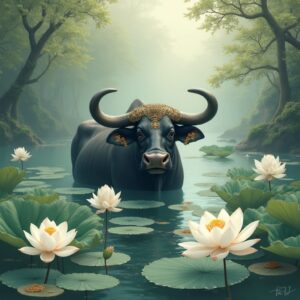 Below are my Facebook posts about Carabao and the show #WhiteLotus, season 3. I haven’t edited anything, only added hyperlinks to the songs.
Below are my Facebook posts about Carabao and the show #WhiteLotus, season 3. I haven’t edited anything, only added hyperlinks to the songs.
Also, check out this interview in Rolling Stone with the music supervisor of White Lotus, Gabe Hilfer.
March 3: So a little bit of escapism here: Season 3 of the addictive TV series White Lotus is set in Thailand and prominently features Carabao music as well as other interesting Thai music. I waited to crow about it until I saw how the music is used and whether this season is any good. The music is being used very, very well, and as of episode three the drama is getting good (but be warned that the opening episode is very off-putting). The show is about rich, spoiled English-speaking tourists vacationing at different (fictional) White Lotus resorts around the world: first season Hawaii, second season Italy, and third season Thailand. It’s usually a very dark show with at least one murder per season, and this season definitely follows that pattern. Anyway, the first song used in episode 1 is Carabao’s “Made in Thailand.” They play the whole song, very loudly, from start to finish while two Thai characters have a scene with English subtitles (so it doesn’t matter that the song drowns out their conversation.) Thus the song is very prominently placed. This is the song that stopped me in my tracks and made me an instant and permanent Carabao fan almost 40 years ago. Episode two does not have any Carabao music, but does have alot of interesting Thai music. Episode 3 has TWO Carabao songs. One will be hard to recognize: they play the introduction to “Welcome to Thailand” very loudly. It sounds very exotic, intriguing, and disturbing. [Edit: This well-known intro is not on the official music video for the version on the album “Welcome to Thailand,” and must be a later addition; it is possibly a call out to some other famous Thai song in a traditional style.] The song “Welcome to Thailand” is about foreigners running amuk with their sleazy pursuits and missing out on Thailand’s true beauty. Thus it is very well placed in the episode. The second song is Sam Cha Carabao, with “Sam Cha” being a Thai Latin-influenced musical style. It’s a song about Carabao songs, actually (it came out on the band’s 15th anniversary), and was no doubt chosen for it’s very upbeat sam cha sound. It may be that whoever is making these musical choices for the show has a deep understanding of the music. OR they just like the cool sound of these songs, but the use of the intro to Welcome to Thailand, has me thinking someone is really plugged in. So I’m calling it now. Given the theme of this season, which seems to be about deep inner turmoil and looking for inner peace, look for the song “Telay Jai” at some point.
April 8: My thoughts on The White Lotus, complete Season 3. No spoilers. So each season has one big theme. The first season was about power and privilege dynamics between the haves and the have nots. The second season asked questions about sex. Season three was supposed to be about spirituality, but I would argue it was about the meaning of life more broadly. The critics are giving bad reviews to Season 3’s finale, but I really liked the ending. Season three started out with some extremely unlikable, maybe despicable characters, such that I didn’t care about any of them except possibly one or two. Shockingly, by the end, I cared about every one of them, and the more despicable had had had the biggest character journeys. The Thai characters mostly spoke in Thai with English subtitles, and were presented on their own terms and not second to the concerns of Westerners. The Thai security guard Gaitok’s storyline was very engaging and the character charming. All sorts of remarkable aspects of Thailand had to be thrown into the story for the Thai flavor: The pervasive Buddhism, the poisonous snakes, lizards in the house, the Songkran festival, the Full Moon party for tourists, the unique costumed dances, and the wonderful and varied types of music, very nicely selected. As for the meaning of life, the explicit discussions and drama of the ending gave a lot to think about–often conveyed with layers of symbolism, much of it visual. As for the Carabao music, no additional songs were played, other than the three I noted from the first three episodes, but the intro to Welcome to Thailand, was repeated several times to foreshadow that something bad was about to happen, that the foreigners were about to do go crazy, party, and do something they would regret (which is an appropriate use of that musical clip). At the end, a section of Made in Thailand was played very quietly for just a moment to bookend the big splashy use of that song at the beginning. More generally, the Carabao music and the Buddhism I gleaned from it, helped me read, or impose, even more symbolism: The lotus leaves at the end (learned from the song Bua Loy), the splashes of water falling back into the ocean (learned from the song Telay Jai). Should you watch this series? Well I hesitate to recommend it because in the beginning, there are so many dark and disgusting scenes, but there are also many moments that are jaw dropping, the whole story is addictive, and I am still pondering the main themes and each character’s resolution with regard to the question of spirituality or the meaning of life. The show did not hand out any easy answers.
